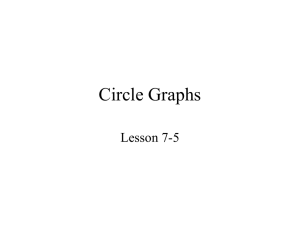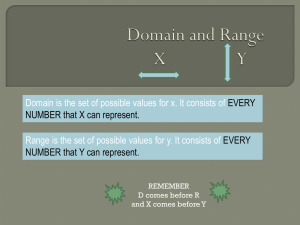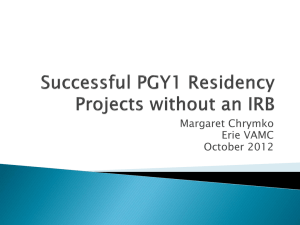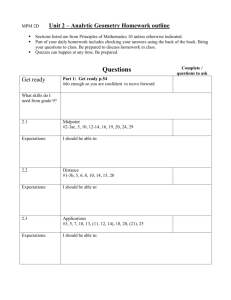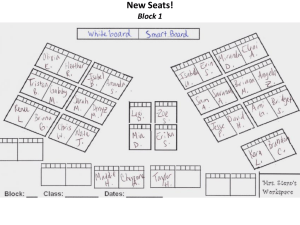Circle VHA Submission to the Oireachtas Joint Committee on the
advertisement
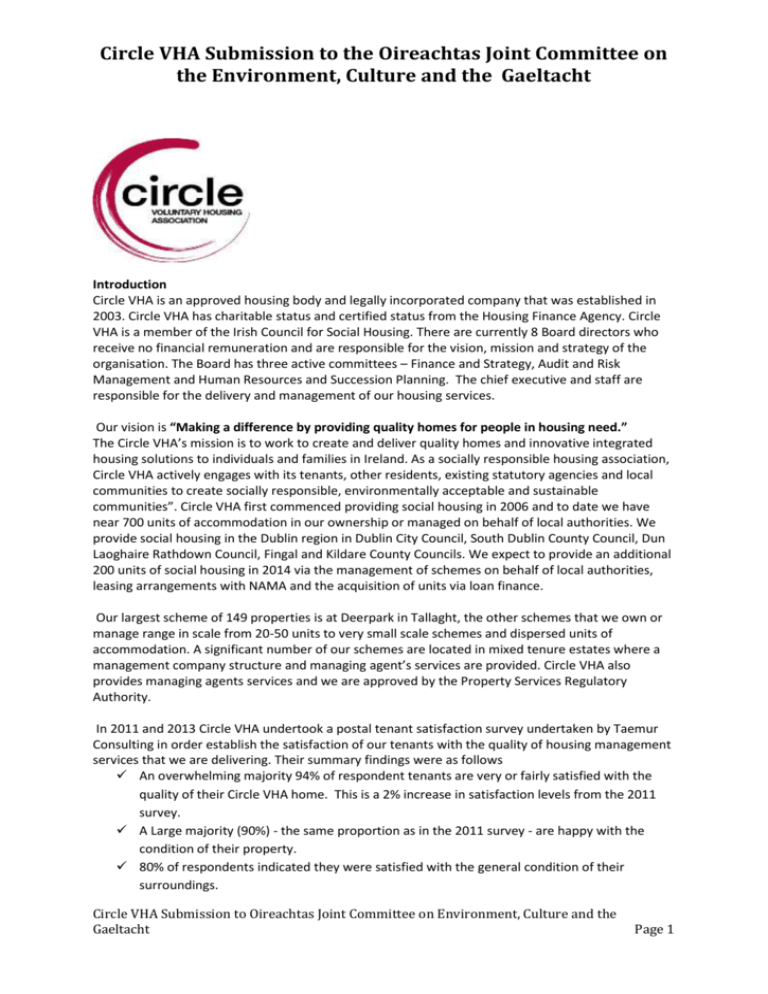
Circle VHA Submission to the Oireachtas Joint Committee on the Environment, Culture and the Gaeltacht Introduction Circle VHA is an approved housing body and legally incorporated company that was established in 2003. Circle VHA has charitable status and certified status from the Housing Finance Agency. Circle VHA is a member of the Irish Council for Social Housing. There are currently 8 Board directors who receive no financial remuneration and are responsible for the vision, mission and strategy of the organisation. The Board has three active committees – Finance and Strategy, Audit and Risk Management and Human Resources and Succession Planning. The chief executive and staff are responsible for the delivery and management of our housing services. Our vision is “Making a difference by providing quality homes for people in housing need.” The Circle VHA’s mission is to work to create and deliver quality homes and innovative integrated housing solutions to individuals and families in Ireland. As a socially responsible housing association, Circle VHA actively engages with its tenants, other residents, existing statutory agencies and local communities to create socially responsible, environmentally acceptable and sustainable communities”. Circle VHA first commenced providing social housing in 2006 and to date we have near 700 units of accommodation in our ownership or managed on behalf of local authorities. We provide social housing in the Dublin region in Dublin City Council, South Dublin County Council, Dun Laoghaire Rathdown Council, Fingal and Kildare County Councils. We expect to provide an additional 200 units of social housing in 2014 via the management of schemes on behalf of local authorities, leasing arrangements with NAMA and the acquisition of units via loan finance. Our largest scheme of 149 properties is at Deerpark in Tallaght, the other schemes that we own or manage range in scale from 20-50 units to very small scale schemes and dispersed units of accommodation. A significant number of our schemes are located in mixed tenure estates where a management company structure and managing agent’s services are provided. Circle VHA also provides managing agents services and we are approved by the Property Services Regulatory Authority. In 2011 and 2013 Circle VHA undertook a postal tenant satisfaction survey undertaken by Taemur Consulting in order establish the satisfaction of our tenants with the quality of housing management services that we are delivering. Their summary findings were as follows An overwhelming majority 94% of respondent tenants are very or fairly satisfied with the quality of their Circle VHA home. This is a 2% increase in satisfaction levels from the 2011 survey. A Large majority (90%) - the same proportion as in the 2011 survey - are happy with the condition of their property. 80% of respondents indicated they were satisfied with the general condition of their surroundings. Circle VHA Submission to Oireachtas Joint Committee on Environment, Culture and the Gaeltacht Page 1 Circle VHA Submission to the Oireachtas Joint Committee on the Environment, Culture and the Gaeltacht A total of 85% are either very satisfied or fairly satisfied with the neighbourhood in which they live - an increase of 5% from 2011. Circle VHA staff have very high satisfaction ratings. This concerns easy contact (97%), securing assistance (96%), respectful and courteous (96%) and helpful (96%). As an approved housing body Circle VHA operates in the context and policy definition of DECLG policy as per the Building Sustainable Communities (2005), Delivering Homes, Sustaining Communities (2007), Housing Policy Statements 2011 and the Housing Acts of 1966, 1989, 1992, 2009. All the tenants to whom Circle VHA provides social housing have been nominated by the designated local authority. We normally interview the nominations provided and then select the tenants in consultation and agreement with the local authority. Proposals in the General Scheme of the Housing (Miscellaneous Provisions) Bill 2013 From the Circle VHA perspective it is evident that the Bill is based on some of the policy directions expressed in the Housing Policy Statement 2011. In particular the Housing Policy Statement proposed to: To introduce legislation to optimize the efficiency of the PRTB and to include the voluntary and cooperative sectors within the PRTB remit. This policy objective is being enacted in 2014 via the Residential Tenancies Bill 2013. Transfer the responsibility for providing the housing needs of people on long term rent supplement to housing authorities on a phased basis. The role of the voluntary and cooperative sector was stated to be at the heart of the Government’s vision for housing provision. It also proposed the regulation of the sector and a voluntary code of Regulation was announced in 2013. Circle VHA has signed to the VRC and the Housing Agency is now undertaking the primary responsibility for the regulation of the sector. The policy recognised the move from a capital based funded programmes to more revenue based funded programmes for the delivery of social housing. The Programme for Government committed to tackling issues relating to anti-social behavior across all housing sectors. This proposed legislation currently has four substantive sections relating to the Termination of local authority tenancies, Tenant purchase of houses, Housing Assistance Payment. 1. Revised procedure for repossessing local authority dwellings: This proposal is based upon the recent Supreme Court judgement of Anthony Donegan v Dublin City Council and the findings elucidated in that judgement. The major weakness of the DCC case in the judgement was that there was no independent hearing on the merits of the proposed repossession. The resolution of tenancy management issues relating to anti-social behavior and the successful repossession of the property for anti-social behavior is difficult for all landlords as often adjoining neighbours who may be witness to the events that have occurred are fearful of giving evidence against the alleged perpetrator. . The particular proposals are to: Specify the basis of the tenancy breach, request the person causing such breaches to desist Circle VHA Submission to Oireachtas Joint Committee on Environment, Culture and the Gaeltacht Page 2 Circle VHA Submission to the Oireachtas Joint Committee on the Environment, Culture and the Gaeltacht If a warning has been issued and further incidents are repeated within 12 months the local authority may apply for repossession The bill is to protect the identity of persons informing on anti-social behavior The requirement of the tenant to pay rent and to enter into and adhere to rent arrears payments The tenant affected by such warnings has the right to seek an internal review of their case independent of the persons involved in the initial investigation If an application is being made for repossession the basis of the case must be stated in its application to the District Court. The District Court has the right to review the case, make an exclusion order against a person and to have some or all of the court proceedings held in camera. The other aspect of this section of the Bill is where a dwelling is considered abandoned for more than 6 weeks and if the rent payable is one month in arrears. Notice has to be provided to the tenant and they are required to reply within 4 weeks. If the tenant has failed to respond the repossession order may be granted by the District Court In summary Circle VHA is in agreement with the above proposals regarding the procedures for repossession for rent arrears, abandonment and anti-social behavior. The amendments to the 1966 Housing Act will mean that Ireland will be complying with such cases in the application of the European Convention of Human Rights Act 2003. The resolution of antisocial behavior is as stated very difficult to manage and to resolve. The strengthening of the law and its procedures for application will enable better social housing management for rent arrears, anti-social behavior and repossession. Circle VHA understands the basis of which some of the court proceedings may be held “in camera” however it is important that basis of case law relating to housing legislation and housing management is open and substantiated. For Circle VHA and all other AHBs the current resolution of landlord tenant relationships and difficulties such as rent arrears, abandoned dwellings, anti-social behavior are determined by the Deacy Act 1879 and the 1966 Housing Act. Legal action is usually undertaken in the District Court. This process can be a slow process. It is now proposed by the Government that all AHBs and their tenants will under the Residential Tenancies Bill 2013 come under the remit of the PRTB within the next 12 month period. In our view the key question here will be the speed with which the PRTB can respond to and address landlord tenant disputes. Previously because of resource issues the PRTB has been slow in progressing the resolution of such disputes in the private rented sector. It will now have to take on responsibility for an additional 26,000 tenancies which will be a large challenge to its current capacity. 2. Tenant Purchase of local authority houses: This section of the proposed Bill is to enable a scheme of tenant purchase along incremental purchase lines to replace the 1995 tenant purchase scheme and the local authority is to have the power to place an incremental purchase charge on the sale of the dwelling proportionate to the value equal to the discount provided. Circle VHA Submission to Oireachtas Joint Committee on Environment, Culture and the Gaeltacht Page 3 Circle VHA Submission to the Oireachtas Joint Committee on the Environment, Culture and the Gaeltacht Circle VHA would support the basis of the local authority receiving a proportion of the increased value of the asset that the tenant purchaser would receive from the sale of a State asset. Overall Circle VHA recognizes the policy of previous Governments that have enabled tenant purchase, the fact that a significant proportion of owner occupied housing was originally a local authority unit and that tenants often want to purchase the dwelling they rent at discount. Our reservations are for the following reasons: The sale of local authority dwellings diminishes the available supply of social housing dwellings that may become available on the demise of the tenant and or changing needs of the household. The current scale of social housing need is 98,872 households nationally. Many purchasers of affordable housing units are persons on low income in the sub-prime market lending criterion and are very vulnerable to defaulting on their loan repayments. 3. Housing Assistance Payment scheme: The essential proposal is to transfer responsibility for recipients of rent allowance with a long-term housing need from the DSP to DECLG and all local authorities through the HAP scheme. The basis of this long promised policy change dating back to the 1990s. The basis of the proposal is as follows: bring all State social housing services under the local authority system and give local authorities greater flexibility to assist those in need of social housing support; remove where possible barriers for people in receipt of HAP to return to employment by allowing them to remain in the scheme if they gain full-time employment. facilitate greater regulation of the private rented sector, including improved standards of private rented accommodation, and strengthened processes for ensuring tax compliance by landlords. provide greater consistency in the application of social housing policies in relation to needs, allocations, rents and tenure, anti-social behaviour and paths to home ownership across the supported rental market. reduce pressure on capital funding to meet housing needs. provide a more integrated and streamlined service for households seeking support from the State to meet housing costs. Circle VHA supports the policy basis of the Housing Assistance Payment Scheme as stated and we view it as a progressive move for the role of local authorities. Our reasons for supporting the new role for local authorities are as follows: It should enable a more strategic role for the local authority in the management of social housing need It should reduce the poverty trap of persons working on low incomes under the current DSP scheme who lose their entitlement to rent allowance once they are working It confirms a more revenue based funding approach to the supply of social housing Our reservation concerns how this change will be implemented by the Local Authorities. In the past, Local Authorities had a poor record in inspecting private rented accommodation: extra resources and training will be required to enable Local Authorities to discharge this role properly. The current increased costs of private rented accommodation in the urban areas is causing families and individual to become homeless and remain homeless because of the unaffordability of private rented accommodation and the limits or caps placed by DSP on the amount of rent supplement it is willing to provide. The local authorities under HAP will Circle VHA Submission to Oireachtas Joint Committee on Environment, Culture and the Gaeltacht Page 4 Circle VHA Submission to the Oireachtas Joint Committee on the Environment, Culture and the Gaeltacht be faced with the same dilemma as DSP as to its capacity to respond to the payment of rent supplement in an inflationary private rented market. It is apparent that many private landlords who entered in RAS or social leasing schemes are withdrawing from such arrangements as market rents have increased. The financial basis of HAP need to be carefully considered as it may not mean a saving to the State as has been previously anticipated by such a transfer of responsibility from DSP. HAP may create an unanticipated effect on the assessed housing waiting lists once it is implemented. Currently 47% of assessed housing needs are persons residing in private rented accommodation, with 27% of assessed housing need receiving rent supplement. Once HAP is in place this will probably reduce considerably the numbers on assessed housing need. It also enable households who are working to be considered housed under HAP. The net effect of HAP may be an unintended consequence that the households who remain on the social housing need will be households who are not working, living at their family home in overcrowded conditions. This will cause a residualisation of the social housing need in terms of those not working and this will impact adversely upon both local authorities and AHBs housing provision. 4. Miscellaneous: The proposal to have direct deductions of rent contributions from all social welfare payments due to such persons is to be welcomed. This proposal should enable more effective rent management and payment of arrears. 5. Housing Policy: The Housing Policy Statement 2011 stated “Housing in Ireland has been characterised by a persistently hierarchical structure for several decades. This paradigm of housing has private homeownership at the top, with supported home ownership ( tenant purchase of local authority housing, affordable housing) next, self-financed private rented housing further down and State supported rental accommodation at the bottom( rent supplement/social housing tenancies). “The Housing Policy aspires to an objective “to enable all households’ access good quality housing appropriate to household circumstances and in their particular community of choice.” This has been the stated policy of Governments and DECLG for decades. As the Housing Policy Statement stated it should be an objective of policy that the market failure of affordability in terms of imbalances between average prices and affordability does not occur again. A number of factors are very apparent: The structure of the housing sector in Ireland has changed considerably in the past 5 years in terms of tenure mix with a decline in home ownership to 70%, an increase in the private rented market to 18.5% and social housing stable at 11.5%. There are considerable variations regarding housing need and housing supply both within and between regions and urban areas. There has been an increase in social housing demand. Some 71% of the assessed housing needs are on Social Protection incomes only. The collapse of the building sector, loan availability, and excess supply of housing in areas of low housing demand had led to a radically reduced level of new housing provision. The Housing Agency on behalf of DECLG has estimated a new housing supply of 79,660 units will be required over the next 5 years to meet demand. The capital programme for social housing via Local authorities and AHBs has been reduced to just €40M in 2013. At an average new-build cost of €170,000/unit, this would only provide 235 extra units of accommodation p.a. Capital grants via CAS and CLSS for AHBs have been reduced and replaced by revenue based funding for leasing. Circle VHA Submission to Oireachtas Joint Committee on Environment, Culture and the Gaeltacht Page 5 Circle VHA Submission to the Oireachtas Joint Committee on the Environment, Culture and the Gaeltacht The aim of DECLG was for AHBs to be the primary providers of social housing via loan finance with a small proportion of a capital grant/loan via CALF. This policy has not delivered the required outcomes for a variety of factors such as the unwillingness of the Irish banks to provide loan finance. They have a non-strategic view of the sector as per its future role. The lack of statutory regulation of the AHB sector inhibits the banks from providing loan finance on a long term strategic basis. The recent Housing Agency/DECLG review of the CALF will hurt the voluntary housing sector. The authorities will only allow voluntary bodies a 3.6% return on capital (and the capital amount allowed is considerably below the actual amount deployed by the sector). The cost of mortgage capital for the voluntary sector is currently 5% and this is expected to rise considerably over a 20 year mortgage. In addition, the increased cost of units in the major urban areas makes the feasibility of loan finance and repayment via the Payment and Availability too onerous even with the maximum 30% CALF loan. Unless housing policy changes to reflect this, voluntary housing bodies will be unable to increase their housing stocks by new-build. In summary Circle VHA would recommend the following: The Government and DECLG should establish a new national policy and plan for housing. The CALF policy needs further review and development to the new housing market circumstances. 6. Housing rents and prices: Provision should be made in the Housing (Miscellaneous Provisions) Bill 2014 to strengthen Governmental powers to deal with excessive rises in housing rents and house prices. It is self-evident that a bubble has again emerged in house prices and rents in Dublin during the past three quarters. Again, it is a noxious myth that increased housing supply will, of itself, bring house prices and rents back into line. It won’t in 2014-2016, any more than record house completions of 93,000 in 2006 succeeded in moderating the absurd levels of house prices then being experienced. Government must move away from the Anglo-Irish system of more or less letting the housing market set its own prices towards a German model of managing house rents and prices. The German model allows investors a return of 6 - 8% p.a. (or twice what the DECLG thinks Irish VHA’s should subsist on) and secures rents which grow broadly in line with nominal GDP or national income. If a managed market in housing rents were adopted, to keep the playing pitch level, excessive private house price rises would also have to be controlled. This might be secured by exempting from taxation the shelter element common to all housing (say set at €170,000), and by taxing the capital gains on the non-shelter element at a penal rate of 50%. Jerome J. Casey Chairman Circle VHA Justin O’Brien Chief Executive Circle VHA April 8th 2014 Circle VHA Submission to Oireachtas Joint Committee on Environment, Culture and the Gaeltacht Page 6
